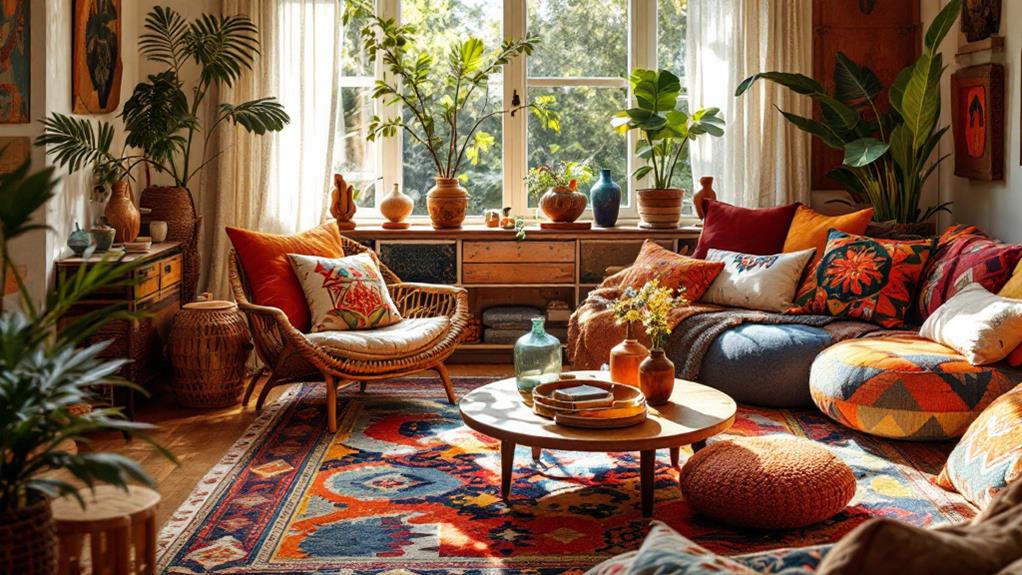
The Role of Fair Trade in Sustainable Home Decor
Fair Trade is integral to sustainable home decor, prioritizing ethical production and environmental sustainability. By ensuring fair wages and safe conditions, it supports marginalized artisans and promotes social equity. The certification fosters transparency in supply chains, allowing informed consumer choices while protecting cultural heritage through traditional craftsmanship. Environmentally, Fair Trade encourages the use of sustainable materials and methods, reducing harmful ecological impacts. Popular items like handwoven textiles and wooden decor not only enhance interior aesthetics but also reflect a commitment to ethical consumption. Delving deeper reveals how Fair Trade balances aesthetics with conscience, reshaping decor markets sustainably.
Key Takeaways
- Fair Trade ensures ethical labor practices, offering fair wages and safe conditions for artisans in the home decor industry.
- Sustainable production methods minimize ecological impact, promoting environmentally friendly practices in home decor.
- Fair Trade certification guarantees transparency in the supply chain, enabling informed and ethical consumer choices.
- Artisans' traditional techniques are preserved, enhancing cultural heritage and aesthetic appeal in sustainable home decor.
- Fair Trade empowers marginalized artisans, contributing to economic stability and social equity in their communities.
Understanding Fair Trade
Fair Trade, a vital concept in sustainable commerce, plays an essential role in reshaping the home decor industry by embedding ethical and sustainable principles into its framework. Central to Fair Trade principles is the commitment to guaranteeing fair wages and safe working conditions for workers in developing countries. This approach aligns with ethical consumerism, where purchasing decisions are influenced by the desire to support equitable and just labor practices.
By promoting transparency in the supply chain, Fair Trade allows consumers to be aware of the origins and ethical dimensions of their home decor purchases.
Moreover, Fair Trade emphasizes sustainable development by advocating for environmentally friendly production methods that reduce ecological impact. This commitment is important in an industry often criticized for unsustainable practices, as it assures that the creation of home decor items does not compromise the environment.
Supporting marginalized artisans by providing stable income and market access is another fundamental aspect of Fair Trade. This empowerment fosters economic growth within communities, thereby reinforcing the social equity objectives of Fair Trade.
Through informed choices, consumers partake in a system that prioritizes workers' rights, social equity, and community development, notably influencing the home decor sector.
Importance of Fair Trade Certification
In the domain of sustainable commerce, obtaining Fair Trade certification serves as a vital mechanism for ensuring that ethical standards permeate the production and distribution of home decor items. At its core, Fair Trade certification guarantees that producers receive fair wages and work in conditions that are both safe and equitable. This commitment to Fair Trade Standards greatly enhances the livelihoods of artisans and workers, fostering healthier communities and contributing to long-term economic stability.
The certification further underscores ethical sourcing by promoting environmentally sustainable practices, thereby reducing the ecological footprint of production processes.
Moreover, the Fair Trade Minimum Price functions as an essential safety net, ensuring that producers maintain a stable income despite market fluctuations. This protective measure is fundamental for safeguarding the economic stability of producers, particularly in volatile markets.
Transparency in supply chains is another hallmark of Fair Trade certification, granting consumers visibility into the origins and ethical context of their home decor purchases. Remarkably, Fair Trade initiatives have empowered approximately 350,000 women, emphasizing gender equity and providing a platform for female participation in agriculture and production. This gender-focused approach enriches communities and bolsters the economic resilience of families worldwide.
Benefits of Fair Trade Decor
How can the integration of Fair Trade principles in home decor transform both consumer habits and artisan livelihoods? By embracing Fair Trade decor, consumers contribute considerably to the economic empowerment of marginalized artisans. This approach guarantees that artisans receive fair wages and stable income, enabling them to uplift their communities and enhance their living conditions.
The cultural significance of Fair Trade decor is profound, as it preserves and promotes traditional crafts and techniques. By supporting these artisans, consumers help maintain unique skills passed down through generations, safeguarding cultural heritage that might otherwise be at risk of disappearing.
In addition, Fair Trade decor fosters environmentally responsible production practices. By minimizing harmful chemical usage, it protects biodiversity and encourages sustainable resource management. This aligns with consumers' growing demand for eco-friendly products, reflecting a shift towards sustainable living.
Additionally, Fair Trade certification assures ethical labor conditions, which prevent exploitation and child labor, thereby fostering social equity and community development.
Incorporating Fair Trade decor in homes not only enhances aesthetic appeal with unique, high-quality items but also reflects a commitment to ethical consumption. This shift in consumer behavior underscores the transformative power of Fair Trade, bridging the gap between style and sustainability.
Artisans and Community Support
Artisans play a pivotal role in the Fair Trade movement, which not only enhances their individual livelihoods but also strengthens community development. Fair Trade provides artisans with fair wages and safe working conditions, contributing considerably to their economic stability. This empowerment is essential for both personal growth and broader community development, as stable incomes allow artisans to invest in local infrastructure, education, and health services.
Moreover, Fair Trade organizations offer direct support by granting artisans access to training and resources. This access is instrumental in improving craftsmanship and business acumen, fostering a culture of continuous skill enhancement.
Importantly, the movement's focus on gender equity is evident, with approximately 350,000 women artisans benefiting from Fair Trade practices. This commitment to women's empowerment not only uplifts individual artisans but also serves as a catalyst for gender parity within communities.
Fair Trade certification is also critical in preserving traditional crafts and techniques. By doing so, it promotes cultural heritage and diversity in home decor, making these products unique and desirable.
Consumers who purchase Fair Trade home decor actively contribute to sustainable artisan communities, supporting their resilience against market fluctuations. This consumer support is integral to ensuring the long-term viability of these communities.
Environmental Impact of Fair Trade
Fair Trade's approach to sustainability extends beyond economic and social dimensions, incorporating significant environmental benefits that align with the growing global emphasis on ecological responsibility.
Central to this are sustainable materials and ecological practices that underpin Fair Trade's environmental framework. Producers are encouraged to minimize harmful chemical usage, opting instead for renewable resources that contribute to biodiversity and soil health. This commitment guarantees that the production processes in the Fair Trade model are not only ethically sound but also environmentally restorative.
The Fair Trade Minimum Price serves as an economic lever, enabling farmers to invest in sustainable agricultural methods that combat climate change effects and enhance ecological resilience.
This financial security fosters an environment where long-term ecological balance is prioritized over short-term gains. Training initiatives further support this by equipping artisans and farmers with knowledge on sustainable practices, leading to improved land and resource management.
Popular Fair Trade Decor Items
Handwoven textiles and sustainable wooden decor have emerged as prominent choices among Fair Trade enthusiasts, offering both aesthetic and ethical appeal.
These handcrafted items not only enhance the uniqueness and character of home interiors but also play a vital role in supporting artisan communities by preserving traditional craftsmanship and ensuring fair compensation.
Unique Handcrafted Textiles
Stepping into the domain of unique handcrafted textiles reveals a transformative journey where artistry meets ethical consumerism.
These textiles, including handwoven rugs and pillow covers, embody cultural significance through their preservation of traditional artisan techniques. Such craftsmanship not only enhances the aesthetic appeal of home decor but also serves as a demonstration of the diversity and richness of global artistry.
Each piece tells a story, woven with the threads of cultural heritage and skilled labor, offering consumers a tangible connection to the artisans' world.
Fair Trade initiatives in the textile industry guarantee that these handcrafted items are created under ethical conditions. Artisans are assured fair wages and safe working environments, addressing critical issues such as child labor and exploitation.
Additionally, many of these textiles are crafted from sustainable materials like organic cotton and recycled fibers, aligning with eco-friendly practices that minimize environmental impact.
Sustainable Wooden Decor
Sustainable wooden decor represents a harmonious blend of artistry and ethical responsibility, offering consumers an opportunity to enhance their living spaces while contributing to a more sustainable world.
At the heart of this movement is the commitment to responsible wood sourcing, ensuring that timber used in decor items like handcrafted jewelry boxes and bowls is obtained in compliance with Fair Trade standards. This approach not only supports environmental sustainability but also guarantees ethical craftsmanship, providing artisans with fair wages and safe working conditions.
Fair Trade initiatives in wooden decor promote the use of reclaimed or sustainably harvested wood, aiding in the reduction of deforestation and conservation of natural resources. Such practices are essential in maintaining ecological balance and preserving the planet's biodiversity.
The unique designs of Fair Trade wooden products, including sculptures and vases, are exemplars of traditional craftsmanship. These pieces preserve cultural heritage, offering consumers distinct and culturally rich decor options.
Shopping for Fair Trade Decor

When maneuvering through the world of Fair Trade decor, discerning consumers can ascertain their purchases align with ethical and sustainable values by seeking out certifications from organizations like Fair Trade USA™ or Fairtrade America. These certifications guarantee ethical sourcing, promoting transparency and accountability in the supply chain.
By choosing Fair Trade-certified items, consumers directly contribute to artisan empowerment, providing marginalized craftspeople with fair wages and safe working conditions.
Fair Trade home decor encompasses an array of unique, handcrafted pieces, each telling a story of culture and tradition. From vibrant handwoven textiles to intricately designed pottery and skillfully carved wooden decor, these items offer more than just aesthetic appeal—they represent a commitment to supporting sustainable livelihoods and environmentally conscious production methods.
Engaging in Fair Trade shopping also helps combat exploitative practices such as child labor and forced labor, which remain prevalent in the global production of home goods.
To facilitate ethical purchasing decisions, many well-known retailers now offer Fair Trade certified options. Notable examples include:
- Williams Sonoma – Offers a variety of Fair Trade home accessories.
- Target – Provides accessible Fair Trade decor selections.
- West Elm – Specializes in ethically sourced furniture and decor.
Frequently Asked Questions
How Does Fairtrade Contribute to Sustainability?
Fairtrade contributes to sustainability by ensuring ethical sourcing and fair wages, which bolster economic stability. It promotes environmentally friendly practices, reducing harmful impacts and enhancing biodiversity, while fostering transparency in supply chains and empowering marginalized communities towards sustainable development.
What Are the Responsibilities of Fairtrade?
Fairtrade's responsibilities encompass ensuring ethical sourcing by setting standards that uphold fair wages and labor rights. It fosters community empowerment through investing in social projects, supporting environmental stewardship, and promoting gender equity, ultimately enhancing sustainable livelihoods globally.
How Is the Fairtrade Movement Socially Sustainable?
The Fairtrade movement enhances social sustainability by fostering community empowerment and facilitating ethical sourcing practices. It guarantees fair wages, safe working conditions, and invests in community development, promoting gender equity and establishing transparent supply chains for informed consumer choices.
What Is the Purpose of Fairtrade?
Fairtrade's purpose, originating from the need for equitable trade practices, is to positively impact producers by ensuring fair wages, safe working conditions, and sustainable community development, while promoting environmental stewardship and gender equality across global supply chains.
Conclusion
The integration of fair trade principles in sustainable home decor greatly contributes to ethical consumerism and environmental stewardship. Fair trade certification guarantees ethical production practices, benefiting artisans and fostering community development. The environmental advantages further underscore the importance of adopting fair trade decor, as it promotes sustainable resource usage. Popular fair trade items highlight the growing market demand, enabling consumers to make informed purchasing decisions that align with ethical standards. Ultimately, fair trade decor represents a pivotal shift towards sustainable living.



Leave a Reply